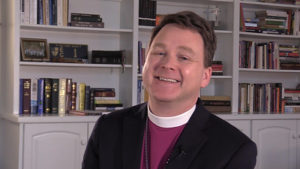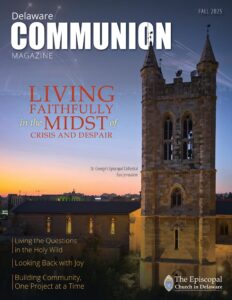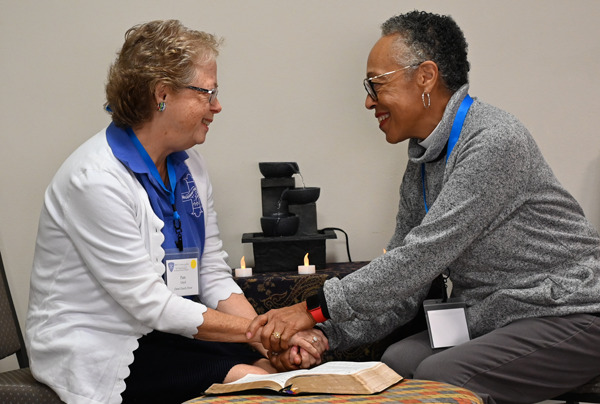The General Convention of The Episcopal Church canons regarding Clergy Disciplinary process are known as Title IV. These make clergy discipline first and foremost a process of discernment, mediation, and pastoral response. The process models those used in the medical, legal, and social work professions.
Canon 1 of Title IV sets the theological context for the process: “By virtue of Baptism, all members of the Church are called to holiness of life and accountability to one another. The Church and each diocese shall support their members in their life in Christ and seek to resolve conflicts by promoting healing, repentance, forgiveness, restitution, justice, amendment of life, and reconciliation among all involved or affected. This Title applies to members of the clergy, who have by their vows at ordination accepted additional responsibilities and accountabilities for doctrine, discipline, worship, and obedience.”
The disciplinary process is defined below.
The Episcopal Church in Delaware is dedicated to an unwavering response of justice and compassion if clergy misconduct occurs, and committed to healing and reconciliation. The diocese and The Episcopal Church recognize that responding to allegations of misconduct requires determination, sensitivity, and respect for all persons affected. Below are several resources and guidelines regarding response to clergy misconduct in the Episcopal Church in Delaware.
The General Convention of The Episcopal Church canons regarding Clergy Disciplinary process are known as Title IV. These make clergy discipline first and foremost a process of discernment, mediation, and pastoral response. The process models those used in the medical, legal, and social work professions.
Canon 1 of Title IV sets the theological context for the process: “By virtue of Baptism, all members of the Church are called to holiness of life and accountability to one another. The Church and each diocese shall support their members in their life in Christ and seek to resolve conflicts by promoting healing, repentance, forgiveness, restitution, justice, amendment of life, and reconciliation among all involved or affected. This Title applies to members of the clergy, who have by their vows at ordination accepted additional responsibilities and accountabilities for doctrine, discipline, worship, and obedience.”
An overview of the process
Under the canons, all matters will be reported to an intake officer (find contact information below). Matters might then be resolved through pastoral care, mediation, an agreement with the bishop, an investigation, or any combination of these. An investigation may result in formal mediation, and, if necessary, a hearing.
The process allows for resolution through whatever means will move those affected toward justice, restitution, amendment of life, repentance, healing, forgiveness, and reconciliation. This can include a variety of interventions for all involved and, if necessary, the suspension or removal of the cleric from ordained ministry.
You can view the Title IV Canons here.
What constitutes clergy misconduct
Title IV specifies that clergy conduct constituting an offense is behavior that will affect their ministry in significant (“material”) ways. These are the areas Title IV addresses. Clergy should refrain from: (Canon IV.4.1 (h) 1-8)
- any act of sexual misconduct;
- holding and teaching publicly or privately, and advisedly, any doctrine contrary to that held by the Church:
- engaging in any secular employment, calling, or business without the consent of the bishop of the diocese in which the member of the clergy is canonically resident
- being absent from the diocese in which the member of the clergy is canonically resident, except as provided in Canon III.9.3(e) for more than two years without the consent of the Bishop Diocesan;
- any criminal act that reflects adversely on the member of the clergy’s honesty, trustworthiness, or fitness as a minister of the Church;
- conduct involving dishonesty, fraud, deceit or misrepresentation;
- habitual neglect of the exercise of the ministerial office without cause; or habitual neglect of public worship, and of the Holy Communion, according to the order and use of the Church; and
- any conduct unbecoming a member of the clergy.
Clergy standards of conduct
Members of the clergy should:
• Maintain confidentiality
• Safeguard property and funds of the church
• Conform to the canons of The Episcopal Church and the rubrics of The Book of Common Prayer
• Abide by ordination vows
• Obtain consent of the bishop before engaging in secular employment
• Obtain consent of the bishop to be absent from the diocese for more than two years
Members of the clergy should not:
• Engage in sexual misconduct (includes sexual behavior with: a member of the congregation; employee; volunteer; person in high school; person under 18 years of age; person legally incompetent; someone with whom the clergy has ever had a pastoral relationship)
• Hold or teach any doctrine contrary to that held by the Episcopal Church
• Commit criminal acts
• Engage in dishonesty, fraud, deceit, or misrepresentation
• Habitually neglect public worship, Holy Communion
• Engage in any conduct unbecoming a member of the clergy
Please note: Members of the clergy are required to report to an intake officer anything that may constitute an offense and to cooperate with the Disciplinary Board.
To report misconduct committed by a lay person
Notify the rector or other clergy person on staff of the lay person’s church or of the church of the offended person. The clergy person should then call the Bishop’s Office. Contact information here.
All suspected child abuse or sexual misconduct must also be reported to Child Protective Services. Call the statewide toll-free hotline 1-800-292-9582 to make the initial report.
In reporting to Child Protective Services, it is helpful for the reporter to provide as much of the following as possible: the name and address of the child and the parent or person responsible for his/her care; the child’s age, sex and race; a description of the alleged abuse and neglect including how long it may have been happening; the name of the school the child attends; the names of other people, especially children, in the home; the reporter’s relationship to the child. Do report even if you are unable to provide all of the information. The person reporting abuse to Child Protective Services is not required to give his or her name.
If you suspect abuse, neglect or exploitation of an adult over age 60, or an incapacitated adult over the age of 18, call the Delaware Adult Protective Services, 800-223-9074.
Anyone may contact a diocesan intake officer to report concerns about the behavior of a member of the clergy (priests, deacons, bishops). This initiates a process to hold clergy accountable for their behavior. You will receive a timely response if you need to leave a message.
The Intake Officer will:
- Listen with respect
- Offer pastoral care and response
- Create a written report regarding the concern(s) presented
- Answer questions about the process
Intake Officer for the Diocese of Delaware:
- The Rev. Ruth Beresford
302.824.5885 (cell)
The Rev. Ruth Beresford has been ordained for 30 years, serving in the Dioceses of Pennsylvania and Delaware in three congregations. Before her seminary education she worked as an investigative caseworker in Child Protective Services, with experience in physical abuse and neglect and in the incest and sexual abuse unit. She is a facilitator for Darkness to Light, a child abuse prevention training program. Over the course of her ordained ministry, Ruth has served in a number of diocesan, community, and church wide bodies to serve God’s people.
- Dr. Guy Mitchell (Mitch) Edmondson
302.381.5985
Dr. Guy Mitchell (Mitch) Edmondson is a life-long Episcopalian and vestry member at Christ Church, Milford. Mitch is a retired family physician whose career has included military, academic, corporate, and private clinical practice. He has served in numerous administrative roles requiring oversight of standards of medical practice, including Chief of Clinic Services in a US Air Force clinic; member of the Virginia Board of Medical Practice; and chair of the Department of Family Medicine and president of the Medical Staff at Bayhealth Medical Center. He and his wife remain active in numerous local civic organizations.
Members of the Diocesan Disciplinary Board, as of January 1, 2024
- Daniel (Dan Bennett, church attorney
- The Rev. Ruth Beresford, intake officer
- The Rev. Glenn A. Duffy
- James Evitts
- Teri Quinn Gray
- The Rev. Canon Mark Harris
- Mr. Paul Hurdle III, president
- The Rev. Dr. Marta Illueca
- Robert (Bob) Irwin
- Consuelo Miller
- The Rev. Rita Nelson
We acknowledge, with gratitude, the late Rev. Margaret “Margie” Pumphrey for the years of dedicated service and ministry she gave to the Disciplinary Board.





